
Eucalyptus haemastoma, commonly known as scribbly gum, is a species of tree that is endemic to the Sydney region. It has white or silvery grey bark, lance-shaped or curved adult leaves, flower buds in groups of between nine and fifteen, white flowers and conical or hemispherical fruit. It is one of three eucalypts with prominent insect scribbles in the bark.

Eucalyptus elata, commonly known as the river peppermint or river white gum, is a species of medium to tall tree that is endemic to eastern Australia. It has rough, compacted bark on the lower trunk, smooth bark above, lance-shaped to curved adult leaves, green to yellow flower buds arranged in groups of eleven to thirty or more, white flowers and hemispherical or shortened spherical fruit.

Eucalyptus blakelyi, known as Blakely's red gum, is a tree endemic to eastern Australia. It has smooth bark on its trunk and branches, dull bluish green, lance-shaped adult leaves, flower buds usually in groups of seven, white flowers and cup-shaped to hemispherical fruit.
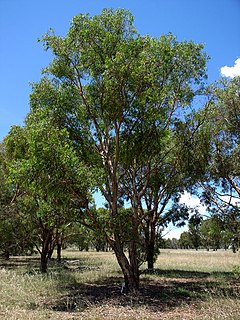
Eucalyptus parramattensis, commonly known as the Parramatta red gum or drooping red gum, is a species of small to medium-sized tree that is endemic to eastern New South Wales. It has smooth, mottled bark, lance-shaped to curved adult leaves, flower buds in groups of seven, white flowers and hemispherical fruit.

Eucalyptus mannifera, commonly known as the brittle gum or red spotted gum, is a species of small to medium-sized tree that is endemic to south-eastern Australia. It has smooth, powdery white bark, lance-shaped to curved adult leaves, flower buds in groups of seven, white flowers and cup-shaped, hemispherical or conical fruit.

Eucalyptus dorrigoensis, commonly known as the Dorrigo white gum, is a species of tree that is endemic to New South Wales. It has smooth white, grey or pink bark, lance-shaped to curved adult leaves, flower buds in groups of seven, white flowers and cup-shaped, conical or hemispherical fruit.
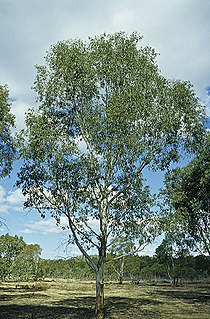
Eucalyptus chloroclada, commonly known as Baradine gum, red gum or dirty gum, is a species of small to medium-sized tree that is endemic to eastern Australia. It usually has fibrous to flaky bark on the trunk and smooth bark above, lance-shaped adult leaves, flower buds in groups of seven, white flowers and hemispherical fruit.
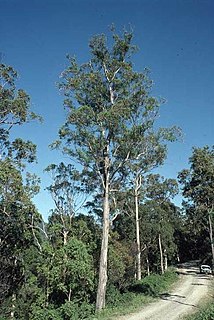
Eucalyptus canaliculata, commonly known as grey gum, is a tree endemic to a small area in New South Wales in eastern Australia. It has smooth, mostly grey bark, lance-shaped to curved adult leaves, flower buds in groups of seven, white flowers and conical or hemispherical fruit.

Eucalyptus aquatica, commonly known as broad-leaved sally, or mountain swamp gum is a tree or mallee that is endemic to a small area of New South Wales in eastern Australia. It has smooth, greyish bark, dull bluish green adult leaves, flower buds arranged in groups of seven, white flowers and conical or hemispherical fruit. It grows in swamps and other places with poor drainage.
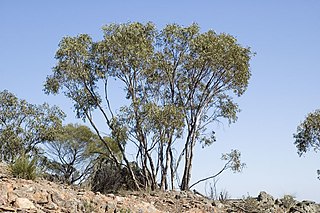
Eucalyptus dwyeri, commonly known as Dwyer's red gum or Dwyer's mallee gum, is a species of small tree, sometimes a mallee that is endemic to eastern Australia. It has smooth, white or cream-coloured bark, lance-shaped to curved adult leaves, flower buds in groups of seven and conical, bell-shaped or hemispherical fruit.
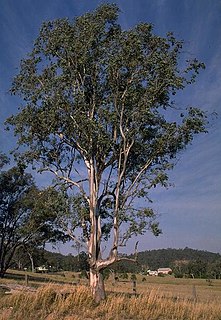
Eucalyptus glaucina, commonly known as the slaty red gum, is a species of small to medium-sized tree endemic to New South Wales. It has smooth, white and grey bark, lance-shaped adult leaves, flower buds in groups of seven, white flowers and hemispherical fruit with the valves protruding well above the level of the rim.
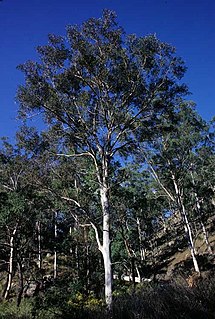
Eucalyptus major, commonly known as grey gum, is a species of tree that is endemic to a small area near the New South Wales - Queensland border. It has smooth greyish bark, lance-shaped adult leaves, flower buds in groups of seven and conical to cup-shaped fruit.

Eucalyptus malacoxylon, commonly known as Moonbi apple box or apple box, is a species of small to medium-sized tree that is endemic to a restricted area of New South Wales. It has rough, fibrous or flaky bark on the trunk and larger branches, smooth bark on the thinnest branches, lance-shaped adult leaves, flower buds in groups of seven, white flowers and cup-shaped, conical or hemispherical fruit.

Eucalyptus mckieana, commonly known as McKie's stringybark, is a species of tree that is endemic to New South Wales. It has rough, stringy bark on the trunk and branches, lance-shaped to curved adult leaves, flower buds in groups of between seven and eleven, white flowers and cup-shaped, barrel-shaped or hemispherical fruit.
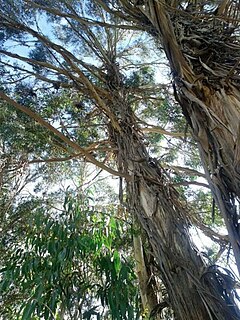
Eucalyptus nobilis, commonly known as ribbon gum or giant white gum, is a species of medium to tall tree that is native to northern New South Wales and south-east Queensland. It has a long, straight trunk with smooth, greyish bark that is shed in long ribbons, lance-shaped or curved adult leaves, flower buds in groups of seven, white flowers and cup-shaped or hemispherical fruit.
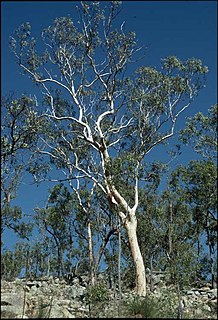
Eucalyptus pachycalyx, commonly known as the shiny-barked gum, is a species of tree that is endemic to north-eastern Australia. It has smooth, pale grey, mottled bark, lance-shaped or curved adult leaves, white flowers and cup-shaped or hemispherical fruit.
Eucalyptus brassiana, commonly known as Cape York gum, gum-topped peppermint or as karo in PNG is a small to medium-sized tree that is native to northern Queensland and PNG. It has rough, hard, fissured bark on the trunk and smooth greyish bark on the branches, narrow lance-shaped adult leaves, flower buds in groups of seven, white flowers and hemispherical or cup-shaped fruit.
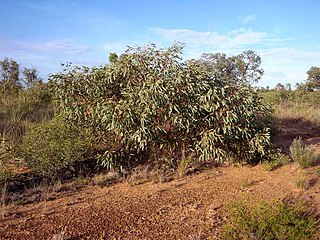
Eucalyptus ammophila, commonly known as the sandplain red gum, is a mallee that is endemic to central and southern Queensland. It has rough fibrous bark near the base and smooth greyish and orange to bronze bark higher up. It has lance-shaped leaves, yellow or creamy flower buds in groups of between seven and eleven, white flowers and hemispherical fruit with strongly raised valves.
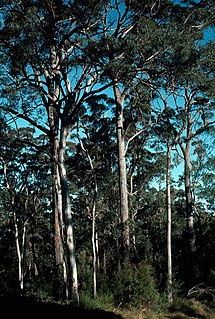
Eucalyptus longirostrata, commonly known as grey gum, is a species of tree that is endemic to south-east Queensland. It has smooth greyish bark, glossy green adult leaves that are paler on the lower surface, flower buds in groups of seven, white flowers and hemispherical to cup-shaped fruit.
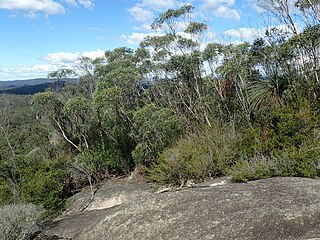
Eucalyptus codonocarpa, commonly known as the bell-fruited mallee ash or New England mallee ash, is a flowering plant that is endemic to eastern Australia. It is a slender mallee with smooth, grey, yellow or brownish bark, lance-shaped to curved adult leaves, flowers buds in groups of three or seven, white flowers and bell-shaped fruit. It grows on the Northern Tablelands in New South Wales and nearby areas in Queensland.





















